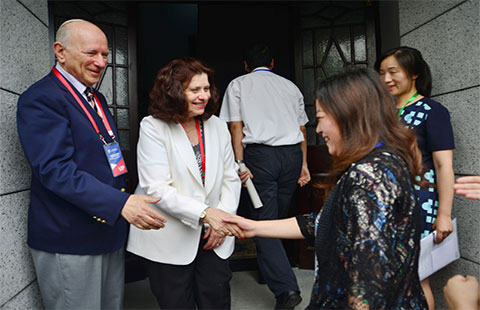No place like home
Updated: 2015-08-29 05:00
By Zhou Wenting in Shanghai(China Daily USA)
|
|||||||||
A growing number of Chinese citizens who have studied or worked abroad are coming back to China to establish their own businesses
Having worked in Japan for a decade, Ding Yan was eligible to apply for a permanent residence permit, but the 34-year-old instead decided to return to China to start her own business.
Ironically, Ding’s decision to move back home was sparked by her adopted country. When her Japanese employers sent her on a business trip to Bejing in 2011, she realized that business opportunities in the Internet industry were abound back in China, and that proved to be the turning point in her career. Ding also added that many Chinese people based overseas find it hard to make breakthroughs after working in a foreign land for about 10 years.
Last year, the Shanghai native launched Me Inc with Stampme, a personalized animated emoji application for people to use on their social media platforms. The application proved to be a hit, with the number of users rising to 5 million within half a year.
“China’s Internet businesses were booming and the entrepreneurial environment in the sector was attractive. I found that there were great opportunities in the country,” Ding said.
Lin Yongshu, who earned a master’s degree in business management in a university in the United Kingdom, returned after graduation two years ago and decided to enter the thriving e-commerce scene in China by launching her online store selling custom-made dresses. She said that parents today also have a different attitude regarding overseas education.
“Apart from hoping that their children will land decent jobs and salaries because of this investment in an overseas education, parents are also hoping their children can gain valuable life experiences and perspectives,” said the 26-year-old native of Guangdong province.
Like Ding and Lin, many Chinese citizens who have been educated abroad have in recent years started to notice business potentials in China and are embarking on the journey home. The Ministry of Education revealed that more than 1.31 million Chinese citizens studying abroad have returned to the country in the past five years, accounting for 72 percent of the number of total returnees. The figure in 2014 was 364,000, an increase of 172 percent from that of 2010.
According to a recent report published by highpin.cn, a Chinese recruitment services website, more than 1.8 million Chinese overseas students have returned to the country, making up more than half of those who have studied abroad. Many of the returnees flocked to Beijing and Shanghai, citing better resources and favorable policies that welcome entrepreneurs, according to experts.
But not all returnees have been able to hit the ground running. For example, some face difficulties carrying out their business plans because of the need to acclimatize to China’s social and business environments.
Wang Dian, who had studied and worked in the United Kingdom and Spain since he was 16, returned to Shanghai two years ago to start his design and advertising business. Wang said that one of the main struggles is with the issue of localization.
“Western fast food giants need to create localized products for the Chinese market, and it is the same when it comes to interior design and architecture. It’s harder for us to fully figure out the market,” said Wang.
The Shanghai government has since last year created new policies to attract and encourage Chinese citizens who have studied abroad to start their businesses back home. There are 11 “entrepreneur parks” for returning talents in Shanghai, the most in the country. About 400 of the 1,700 enterprises established by returning Chinese entrepreneurs have settled in such parks because of the generous government subsidies and lower registered capital standards.
But observers of the entrepreneur market have expressed concern that this lower threshold may trigger the formation of bubbles and some startups may end up collapsing in three to five years. According to Zhou Xuanbo, a researcher at the Development Research Center of the State Council, while favorable policies for kick-starting a business have succeeded at luring opportunistic entrepreneurs who are eager to try their luck, not everyone is capable enough to rise to the challenges involved.
“According to the surveys we have done, young people returning from overseas actually have poorer self-cognition and hands-on experience in the country,” said Zhou.

 Bolt 'somersaults' after cameraman takes him down
Bolt 'somersaults' after cameraman takes him down
 A peek into daily drill of ceremonial artillery unit
A peek into daily drill of ceremonial artillery unit
 93-year-old's murals save Taiwan's 'Rainbow Village'
93-year-old's murals save Taiwan's 'Rainbow Village'
 Top 8 novel career choices in China
Top 8 novel career choices in China
 Hairdos steal the limelight at the Beijing World Championships
Hairdos steal the limelight at the Beijing World Championships
 Chorus of the PLA gears up for Sept 3 parade
Chorus of the PLA gears up for Sept 3 parade
 Iconic Jewish cafe 'White Horse Coffee' reopens for business
Iconic Jewish cafe 'White Horse Coffee' reopens for business
 Beijing int'l book fair opens new page
Beijing int'l book fair opens new page
Most Viewed
Editor's Picks

|

|

|

|

|

|
Today's Top News
Surviving panda cub at National Zoo is male
China eases rules for foreigners to buy property
Ministry denies troops sent to reinforce DPRK border
Stem cell donor offers ray of hope for US boy with leukemia
All creatures great and small help keep V-Day parade safe
China not the only reason global stock markets are in a tailspin
Market woes expected to delay Fed hike
Gunman had history of workplace issues
US Weekly

|

|







